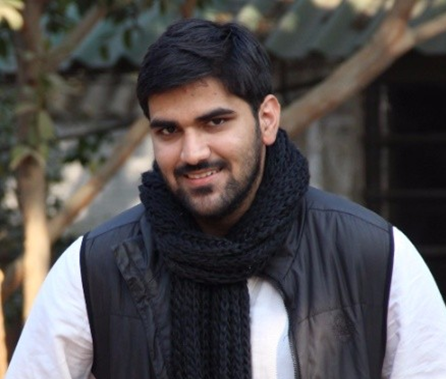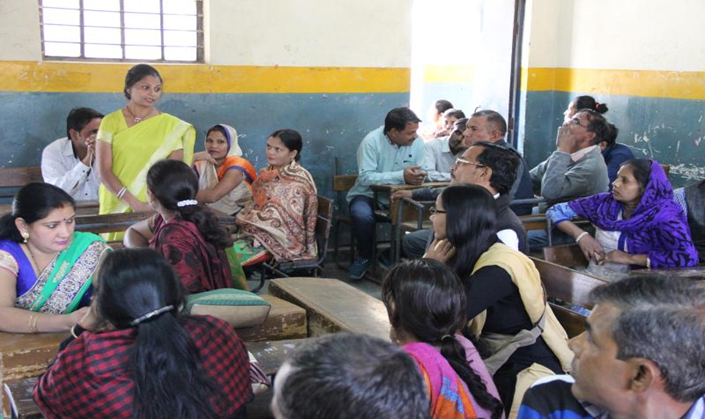Sahil Babbar: Reforming Education - His Organization Transforming Government Schools

Sahil Babbar is a BITS Pilani graduate (Goa, ’15). Ever since graduating with a M.Sc. Mathematics degree, Sahil has been involved in teaching in low-income government schools. His belief in the importance of good quality education for all has led him to co-found Samarthya which works with children and their parents to provide them with the education that they deserve.
Q 1: After graduating from BITS Pilani, what were the key motivators that led you to found Samarthya AEES, a social work organization aimed at revamping government schools, in 2016? How have you gone about this objective in the last 8 years?
After graduating, I did the Teach For India Fellowship from 2015-2017. During the Fellowship, I taught Grade 4 and 5 students in a government school in Delhi. While I was a Fellow, I couldn't help but wonder why the kids in my class had access to a Fellow, but the class right next to mine, which was a Hindi medium class, did not. What could have those kids, who were 9-10 years old, done so wrong that they were deprived of a good teacher and basic facilities?
I wanted to make sure that every child in a government school in India had access to good education. In order to solve for everyone, I had to dream big, dream bold, and dream high. BITS taught us to do exactly that, and be ambitious. It taught us problem-solving skills, and I wanted to apply that. I wanted to take a swing at solving problems on a large scale.
This led my colleagues and me to the realization that any solution for the education crisis in India has a higher chance of being successful if it is systemic- if it can go through the existing administrative structures and reach every single student in the public education system.
Thus, began our quest to look for systemic avenues through which we could work on improving the quality of the public education system. One of the avenues we found was School Management Committees (SMCs). SMCs are participatory platforms composed of parents, teachers, and community members. It is mandated to be formed in every government school of the country under Section 21 of the Right to Education Act (2009). The other avenue was Parent Teacher Meetings (PTMs).
Despite these provisions, we observed that these platforms lie defunct. Their quality and frequency are woefully inadequate. We recognized that activating these platforms and fostering voice and agency in stakeholders to leverage these platforms to voice their concerns and aspirations was the need of the hour. Thus, Samarthya was born.

Over the past 8 years, we have gone from working in partnership with schools, to districts, to the state education department. We have worked on strengthening parent participation and activating participatory platforms such as SMCs and PTMs in Delhi, Haryana, Punjab and Nagaland. Currently, our work reaches 35,000+ govt. schools across three states- Punjab, Haryana and Nagaland.
Our approach has always been systemic, because systemic is sustainable. A layman may think that government systems do not work- it is riddled with red-tapism and bureaucracy. They may think that any effort to bring change is futile. But, it is not always so black and white. There is nuance. Change may be hard to achieve, but it is definitely possible. It requires patience and concentrated effort. It requires one to work around the constraints and challenges of the system, without opting for shortcuts.
Q 2: You have served 2 years as a Fellow at Teach For India. How was your experience there and would you recommend it to BITSians who are interested in this field of social work?
Yes, I would recommend the Teach For India (TFI) fellowship. It gives exposure to the realities of a government school or a low-income private school, which can spark ideas that have the potential to change the country. This exposure, combined with the intellect, enthusiasm and passion of a BITSian can serve the world in a great way.
Over the two years of my fellowship, I learnt to be patient. Teaching is an extensive daily process and it teaches you to be resilient. As I was placed in a government school, I had to learn how to channel my frustration in a system that was not fully effective. It was a great opportunity for me to grow my leadership abilities as well.
TFI gave me the opportunity to explore various paths after the fellowship. It helped me lay the foundation as an entrepreneur. The TFI ecosystem was a huge enabler during and after my fellowship- my managers, peers, alumni - everyone offered timely support.
Q 3: During your time at BITS Pilani, you were the Marketing Head for the Department of Sponsorship and Marketing. Do you think the opportunity to play such a role, has shaped you Today?
Without a doubt, being the Marketing Head for the Department of Sponsorship and Marketing has shaped me. During this stint, I realized my passion and love for leadership. I realized my ability to do sales. It filled me with a high sense of possibility.
I was able to motivate the team and raise money through all the team members. I learnt to deal with freshers and build their skills and confidence to take up this work. I also learnt to navigate through the ambiguities that come with the role and raise funds along with it.
Q 4:With a wealth of experiences, you have had and all the great work you have done, what plans do you have for the future?
I want to take the cause of participation to more places- nationally and internationally. I want to sensitize the youth, the development sector at large, and the philanthropic space on the need and importance of participation, so that more people are encouraged and supported to take up this work
You Might Also Like
- BITS to Baker Hughes: Shad Hussain’s Journey Through Turbulent Times
- Be Cool: Navigating Life, Literature, and Mental Health with Shashi Warrier
- Coaching Across Cultures: Brajesh Bajpai’s Journey of Learning, Leading, and Adapting
- From Engineer to AI Leader: An Interview with Akhil Singhal on Startups, Strategy, and the Future of Gen A
- From Circuits to Capital Markets: Deepak Joshi’s Global Finance Journey














